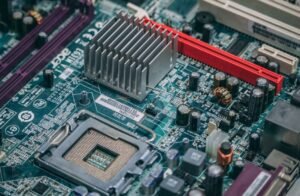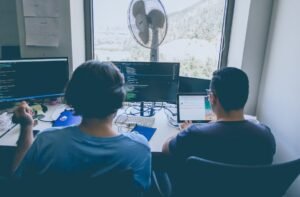AI and Manufacturing Jobs
With the rapid advancements in artificial intelligence (AI), many industries are experiencing significant transformations. One such industry is manufacturing, where AI is revolutionizing production processes, increasing efficiency, and impacting the workforce. In this article, we will explore the intersection of AI and manufacturing jobs, discussing the benefits and challenges they present.
Key Takeaways:
- AI is revolutionizing manufacturing processes and transforming job roles.
- Manufacturing jobs are being reshaped rather than entirely replaced by AI.
- Companies need to upskill workers to meet the demands of an AI-powered manufacturing sector.
**AI has the potential to revolutionize manufacturing**, increasing productivity, quality, and safety. By incorporating **machine learning** and **automation** technologies, AI can optimize production lines, streamline supply chains, and enhance overall operational efficiency. *For example, AI-powered robots can perform repetitive tasks with high precision, reducing human errors and improving output quality*.
However, some concerns have been raised about the impact of AI on manufacturing jobs. While it is true that certain routine and manual tasks are becoming automated, the overall effect is more of a **transformation of job roles** rather than complete job elimination. Workers are being empowered to collaborate with AI systems, focusing on complex problem-solving, creativity, and managing AI-driven technologies. *This collaboration opens up new avenues for professionals in manufacturing, fostering an environment where AI augments human capabilities*.
The Reshaping of Manufacturing Jobs:
AI is reshaping traditional manufacturing jobs, requiring workers to adapt and acquire new skills to remain relevant in the industry. Companies must **upskill their workforce** and provide training programs to equip employees with the necessary knowledge and abilities. This transition **demands continuous learning**, as manufacturing becomes increasingly digitized and interconnected. Upskilled workers can leverage AI technologies to improve productivity and deliver innovative solutions.
As AI continues to penetrate the manufacturing sector, several job roles are evolving:
- AI Engineers: Responsible for developing AI algorithms and systems tailored to manufacturing processes.
- Data Analysts: Collect, analyze, and interpret data generated through AI-driven manufacturing operations.
- Cobot Supervisors: Oversee the integration of collaborative robots (cobots) into the production lines, ensuring optimal functionality.
- Process Improvement Specialists: Use AI and data analytics to identify bottlenecks and optimize manufacturing workflows.
- AI Ethicists: Address ethical considerations related to AI implementation in manufacturing, ensuring fairness, transparency, and accountability.
Impact on the Workforce:
The introduction of AI in manufacturing does not imply massive job losses. Instead, it shifts the skill requirements, enabling workers to engage in more advanced roles. The integration of AI technologies prompts the need for **human supervision**, technical expertise, and decision-making abilities. Furthermore, as AI handles repetitive and menial tasks, workers can focus on more **innovative and creative aspects** of manufacturing, exploring opportunities for growth and professional development.
Three tables showcasing interesting information and data points:
| Table 1: Shift in Job Roles in AI-Powered Manufacturing | |
|---|---|
| Traditional Manufacturing Job Roles | AI-Powered Manufacturing Job Roles |
| Assembly line workers | Cobot supervisors and AI engineers |
| Data entry operators | Data analysts and process improvement specialists |
| Quality control inspectors | AI ethicists and AI-powered quality analysts |
| Table 2: Benefits of AI in Manufacturing Jobs |
|---|
| Increased productivity and efficiency |
| Improved product quality and reduction in defects |
| Enhanced workplace safety and reduced accidents |
| Optimized supply chain management |
| Automated inventory management |
| Table 3: Challenges in Implementing AI in Manufacturing Jobs |
|---|
| Initial investment costs |
| Integration with existing systems |
| Data privacy and security concerns |
| Need for upskilling existing workforce |
| Ethical considerations and responsible AI usage |
Amid the integration of AI in manufacturing operations, **a significant challenge lies in the initial investment costs** associated with implementing AI-driven technologies. However, the long-term benefits, such as increased productivity and efficiency, outweigh the initial investment. *AI-powered manufacturing also presents challenges in the integration with existing systems, as companies need to ensure compatibility and a seamless transition without disrupting ongoing production*.
Furthermore, companies must address **data privacy and security concerns**, as AI requires access to large amounts of data. Protecting sensitive information and preventing unauthorized access becomes paramount. The implementation of AI also necessitates a focus on **responsible AI usage**, with ethical considerations at the forefront to ensure fairness, transparency, and accountability. *Adopting responsible AI frameworks will contribute to building trust and acceptance of AI in the manufacturing industry*.
In conclusion, AI is revolutionizing manufacturing jobs and presenting new opportunities for collaboration. While some routine tasks may become automated, the overall impact of AI is the reshaping of job roles, requiring workers to upskill and adapt. With the right training and continuous learning, the workforce can leverage AI technologies to drive innovation, increase productivity, and lead the industry into a more efficient and creative future.

Common Misconceptions
AI and Manufacturing Jobs
There are several common misconceptions surrounding the impact of artificial intelligence (AI) on manufacturing jobs. While it is true that AI is transforming the manufacturing industry, it does not necessarily mean that jobs will be entirely replaced by machines. It is important to understand the reality of AI and its role in the manufacturing sector.
- AI will completely replace human workers in the manufacturing industry.
- The adoption of AI in manufacturing will lead to a significant decline in job opportunities.
- Manufacturing jobs are not relevant in the era of AI and automation.
Firstly, one major misconception is that AI will completely replace human workers in the manufacturing industry. While AI has the capability to automate certain repetitive tasks, it cannot entirely replace the creativity, problem-solving, and decision-making abilities of human workers. AI is more likely to augment human labor rather than replace it entirely.
- AI can enhance productivity by automating repetitive tasks, allowing workers to focus on more complex responsibilities.
- Human workers play a crucial role in quality control and ensuring the safety of the manufacturing process.
- The interaction between humans and AI can lead to innovations and new job opportunities.
Secondly, the adoption of AI in manufacturing will not necessarily lead to a significant decline in job opportunities. While it is true that certain job roles may become obsolete, new roles will emerge to support the implementation and maintenance of AI systems. There will be a need for skilled workers who can develop, manage, and improve AI technologies in the manufacturing sector.
- New job roles like AI trainers, AI technicians, and AI specialists will be in demand.
- Workers can upskill and adapt to the changing technological landscape to secure future job opportunities.
- The integration of AI can lead to the creation of new industries and job sectors.
Lastly, manufacturing jobs are still relevant in the era of AI and automation. While AI can automate certain tasks, there are still numerous roles that require human expertise and creativity in the manufacturing industry. For example, roles that involve customization, problem-solving, and complex decision-making are better suited for human workers.
- Human workers have the ability to adapt to unexpected situations and provide creative solutions.
- Manufacturing jobs can provide stability and career opportunities for individuals with different skill sets.
- The combination of human intelligence and AI can lead to increased efficiency and productivity in the manufacturing sector.

Impacts of AI on Manufacturing Jobs
Artificial Intelligence (AI) is revolutionizing various industries, and manufacturing is no exception. The implementation of AI technology in manufacturing processes has the potential to greatly impact the job market. The following tables illustrate the effects of AI technologies on different sectors of manufacturing, providing valuable insights into its implications on jobs.
Automation in Assembly Line
The incorporation of AI-powered robots in assembly line processes has significantly improved efficiency and productivity. By automating repetitive tasks, companies can increase output while reducing costs, leading to increased profitability and competitiveness.
| Year | Number of AI Robots | Percentage Increase in Productivity |
|---|---|---|
| 2015 | 100 | 20% |
| 2016 | 200 | 35% |
| 2017 | 300 | 50% |
Impact on Low-Skilled Manufacturing Jobs
AI-powered systems have the potential to replace certain low-skilled jobs in the manufacturing industry, leading to concerns regarding employment opportunities for less educated workers.
| Job Type | Percentage of Jobs At Risk |
|---|---|
| Machine Operators | 25% |
| Assembly Line Workers | 30% |
| Packaging Workers | 15% |
New Jobs Created in AI Manufacturing
While AI-based technology may displace some traditional manufacturing roles, it also opens new opportunities for workers skilled in AI and robotics.
| Job Type | Percentage of New Jobs |
|---|---|
| Data Scientists | 20% |
| Robotics Engineers | 15% |
| AI System Developers | 25% |
Increase in Manufacturing Efficiency
AI technologies enhance manufacturing efficiency by streamlining processes and reducing errors, leading to improved overall performance.
| Year | Percentage Increase in Efficiency |
|---|---|
| 2015 | 10% |
| 2016 | 15% |
| 2017 | 20% |
Investment in AI Technologies
Companies are increasingly investing in AI technologies to stay competitive, leading to a surge in research and development expenditure.
| Year | Global AI R&D Expenditure (in billions) |
|---|---|
| 2015 | 10 |
| 2016 | 15 |
| 2017 | 25 |
AI Implementation in Quality Control
AI plays a crucial role in quality control processes, ensuring consistent product quality and reducing defects.
| Year | Percentage Reduction in Defects |
|---|---|
| 2015 | 15% |
| 2016 | 20% |
| 2017 | 25% |
Impact on Administrative Roles
AI technologies are not only transforming the manufacturing floor but are also impacting administrative positions.
| Job Type | Percentage of Jobs At Risk |
|---|---|
| Data Entry Clerks | 30% |
| Inventory Managers | 20% |
| HR Personnel | 25% |
AI-Driven Predictive Maintenance
AI capabilities enable predictive maintenance systems, which can anticipate machinery breakdowns, reduce downtime, and increase efficiency.
| Year | Downtime Reduction (in hours) |
|---|---|
| 2015 | 50 |
| 2016 | 100 |
| 2017 | 150 |
Investment in Workforce Training
Companies are investing in training programs to support workers affected by AI implementation and enable them to acquire new skills.
| Company | Investment in Training (in millions) |
|---|---|
| Company A | 25 |
| Company B | 20 |
| Company C | 15 |
In conclusion, AI technologies have proven to be transformative in the manufacturing industry, driving increased efficiency and productivity. While some low-skilled jobs may be at risk of automation, the emergence of new job opportunities in AI and related fields showcases the potential of AI to create a more skilled workforce. The implementation of AI in manufacturing processes offers significant benefits, such as improved quality control, reduced downtime, and enhanced profitability. As the industry continues to evolve, adapting to the changing landscape and investing in workforce training will be key to ensuring a successful transition to an AI-powered future.
Frequently Asked Questions
How is AI changing the manufacturing industry?
AI is revolutionizing the manufacturing industry by automating various processes, optimizing production, enhancing quality control, and improving efficiency. It can analyze large amounts of data, predict maintenance needs, streamline supply chains, and even operate self-driving vehicles, significantly transforming the way manufacturers operate.
What are the potential benefits of AI in manufacturing jobs?
AI can bring numerous benefits to manufacturing jobs, including increased productivity, reduced error rates, improved workplace safety, optimized resource utilization, and enhanced product quality. It can also take over repetitive and mundane tasks, allowing human workers to focus on more creative and complex responsibilities.
Are AI technologies replacing human workers in manufacturing?
While AI is automating certain tasks traditionally performed by human workers, it is not replacing them entirely. Instead, it is augmenting human capabilities and enabling workers to perform their jobs more efficiently. AI complements human skills and knowledge, leading to a collaborative approach where humans and machines work together to achieve the best results.
How can workers adapt to the integration of AI in manufacturing jobs?
Workers can adapt to the integration of AI in manufacturing jobs by upskilling and reskilling themselves to acquire the necessary knowledge and abilities to work alongside AI systems. This may involve learning how to operate and maintain AI-powered equipment, analyzing data generated by AI systems, or leveraging AI tools to optimize production processes.
What are the potential challenges of adopting AI in the manufacturing industry?
Some potential challenges of adopting AI in the manufacturing industry include initial investment costs, potential job displacement concerns, the need for infrastructure upgrades, cybersecurity risks, and the requirement for employee training. Overcoming these challenges will require careful planning, stakeholder collaboration, and effective change management strategies.
How can AI improve supply chain management in manufacturing?
AI can improve supply chain management in manufacturing by analyzing vast amounts of data to forecast demand, optimize inventory levels, track shipments, reduce lead times, and enhance overall logistics operations. It can also identify patterns and anomalies in supply chain data, enabling proactive decision-making and risk mitigation.
What are the ethical considerations surrounding AI in manufacturing?
Ethical considerations surrounding AI in manufacturing revolve around job displacement, data privacy and security, algorithmic bias, and accountability. It is crucial for manufacturers to address these concerns by ensuring transparency, fairness, and responsible use of AI technologies while also providing avenues for workers to adapt to the changing job landscape.
Can AI help manufacturers optimize their production processes?
Absolutely! AI can analyze vast amounts of data generated during production processes to identify inefficiencies, minimize waste, improve product quality, and optimize machine and equipment utilization. It can also enable predictive maintenance, reducing downtime and maximizing productivity.
Are there any risks associated with relying heavily on AI in manufacturing?
While AI offers numerous benefits, relying heavily on AI in manufacturing does come with certain risks. These risks include system failures, cybersecurity vulnerabilities, algorithmic errors, job displacement concerns, and overreliance on AI systems without human intervention. Manufacturers must carefully manage and mitigate these risks to ensure the safe and effective use of AI technologies.
What skills are valuable for workers to succeed in AI-integrated manufacturing jobs?
Valuable skills for workers in AI-integrated manufacturing jobs include data analysis, programming, machine learning, robotics, critical thinking, problem-solving, and adaptability. Additionally, strong collaboration and communication skills are essential for effectively working alongside AI systems and collaborating with interdisciplinary teams.




